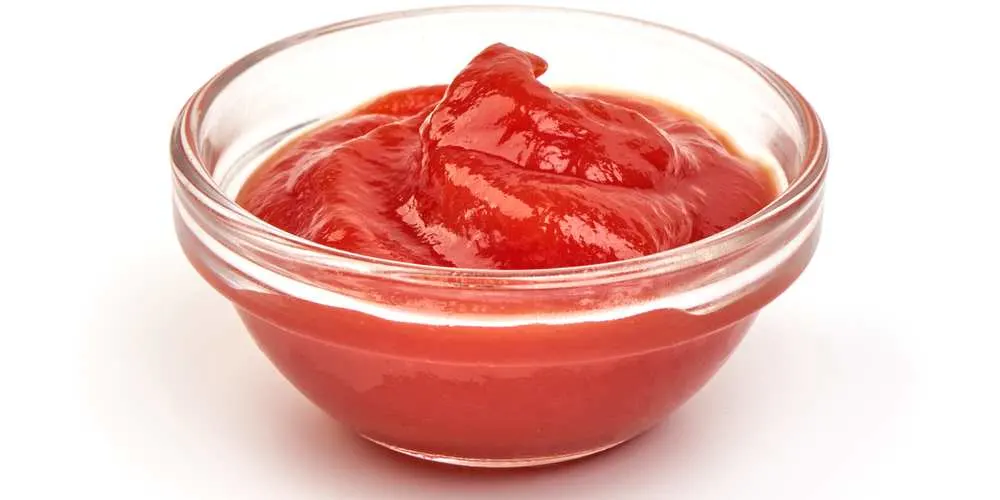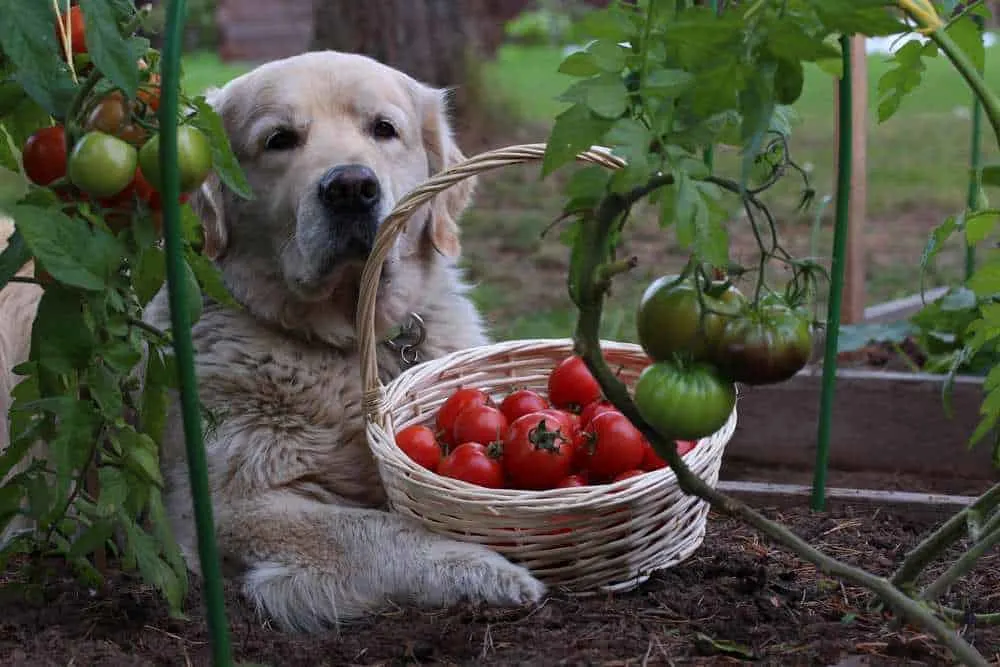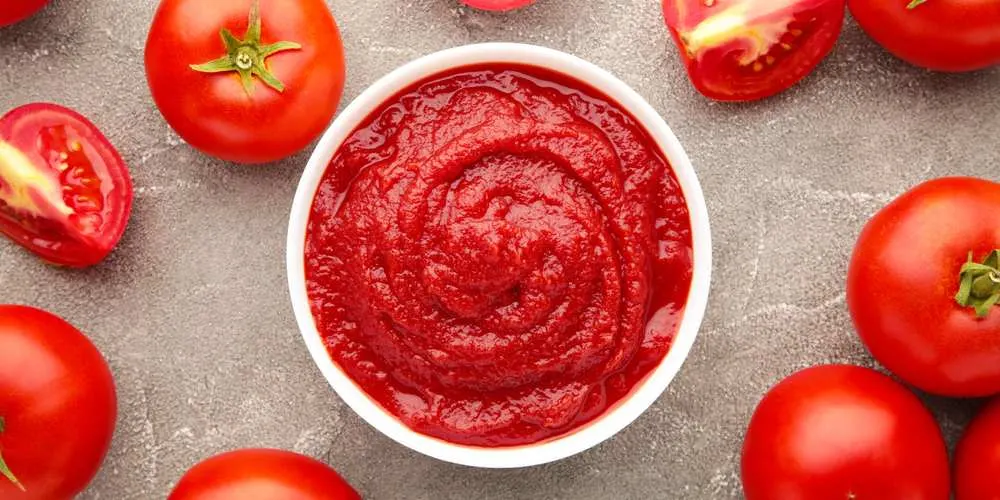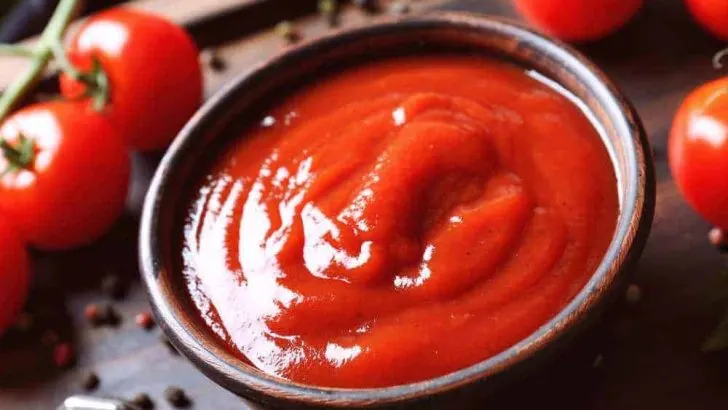Ketchup is probably the most known condiment, next to mayo. Every fridge has a pack or a bottle of ketchup just standing there, waiting for some fries. As we use it so often, it’s pretty much impossible that your dog didn’t consume any at all by now. So the question remains – can dogs eat ketchup?
Whether it was on fries or pizza, ketchup is always a tasty addition to your dish. Even though Americans love it so much, ketchup has a very different origin. The word ketchup actually comes from the Chinese word ke-tsiap, which translates to pickled fish sauce.
At starters, ketchup wasn’t even a condiment; it was more of seasoning for various recipes. Throughout the years, ketchup traveled through different cultures and countries, and, with that, it changed a lot. At some point, tomatoes were added – and that’s how we came to today’s version of ketchup.
Even though ketchup’s history is very intriguing, that’s not why you’re reading this article. You’re here to learn about ketchup consumption in dogs, and that’s what you’re going to get. This tomato product comes with a lot of dilemmas when paired up with your dog, so if you want to know if ketchup is a dog-friendly product, read along!

Can Dogs Eat Ketchup?
If we’re looking at it all black and white, the answer to your question is no. Dogs shouldn’t eat ketchup. But, a small amount of ketchup occasionally isn’t going to harm them.
Ketchup ingredients can be harmful to your pup, but it’s unnoticeable to your dog’s health when given in tiny amounts.
Ketchup is usually made out of tomatoes, vinegar, sugar, and a lot of seasonings. As a responsible dog owner, you know that many seasonings aren’t right for your four-legged friend.
Vinegar also may not be entirely safe for your dog. While some dogs are not going to have problems with consuming diluted vinegar, most dogs will probably not react well. Vinegar can cause stomach issues, especially for small dogs with sensitive stomachs.
Sugar, also, isn’t suitable for dogs. Ketchup, especially the store-bought one, is filled with sugar. When a dog consumes a lot of sugar, it can lead to many health problems like obesity, cavities, and diabetes. Commercial ketchup contains many more ingredients than mentioned above, as it has flavor enhancers and is highly processed, which definitely isn’t beneficial to your dog.
Nutritional Value
Here’s the nutritional value for one tablespoon (17 grams) of store-bought ketchup:
| Calories | 19 |
| Sodium | 154 mg |
| Potassium | 53,6 mg |
| Dietary fiber | 0.1 grams |
| Sugar | 3.7 grams |
| Protein | 0.2 grams |
As you can see, ketchup doesn’t have a remarkable nutritional value. It basically has zero nutritional value for your dog. Besides that, ketchup contains a lot of sugar relative to its portion. This sugary condiment contains almost no dietary fiber, and it can only contribute to your dog’s weight.
Can Dogs Eat Tomatoes?
Tomatoes are okay when given occasionally to dogs. However, tomatoes do have a compound that can be toxic to dogs. Solanine and tomatine are substances found in the tomato’s green parts: the stem and the leaves. When a dog ingests solanine and tomatine in high quantities, it can cause some harm.
The good news is that solanine is mostly found in high quantities in unripened tomatoes and the green parts. The ripe fruit by itself doesn’t have that much solanine, so it’s considered safe for dogs in moderation.
When you give your dog tomatoes, always make sure that it has a bright red color. The riper the tomato, the less potential harm it can cause. For the people who have tomatoes in their garden, don’t let your dog chew on leaves or eat green tomatoes.
Signs that your dog consumed too much solanine or tomatine are:
- Stomach upset
- Loss of coordination
- Tremors
- Seizures
- Muscle weakness

Can Ketchup Be Good For Your Dog?
As we mentioned before, ketchup doesn’t have any nutritional value. With its high sugar and salt content, it can mostly cause risks rather than any benefits. On the other hand, ripe tomatoes have many health benefits for dogs when given in moderate amounts. Instead of ketchup, you can occasionally offer your dog unseasoned tomato pure.
In contrast to ketchup, tomatoes are rich in nutrients. Some dog foods contain “tomato pomace,” which is the pulp, skin, and crushed-up seeds of tomatoes. Tomato pomace is high in fiber, promoting healthy digestion and bowel movements in dogs and helping with constipation.
Tomatoes are filled with vitamin A and vitamin C, so it’s a great immunity booster. Also, tomatoes contain potassium, which regulates blood pressure. Lycopene in tomatoes promotes healthy bones and can reduce the risk of stroke.
What About Tomato Sauce?
Tomato sauce, just like ketchup, contains a lot of added seasonings, such as salt and sugar. Most tomato sauces are also made with garlic, which can be poisonous for your dog. Generally, tomato products like tomato soup, tomato juice, ketchup, and tomato sauce all contain ingredients that aren’t good for your dog.
However, small doses are not going to harm him. How much is considered a small amount for your dog depends on your dog’s size, age, and breed. You can avoid potential health issues by skipping tomato products. Give your dog a few slices of tomato moderately instead.

Potential Health Risks
Unfortunately, ketchup and other commercial or homemade tomato products can cause some problems for your dog. These are the possible risks if your dog consumes ketchup every day or frequently in larger quantities.
Diarrhea And Vomiting
If you leave the ketchup bottle in places that your dog can easily reach, he’s probably going to eat as much as he can before you see him. When a dog consumes a large quantity of ketchup, it usually results in stomach issues like diarrhea or vomiting. If the vomiting or diarrhea persists, call your veterinarian.
Obesity
The high sugar content in ketchup is a red flag for your dog’s health, especially in the long run. When a dog is obese or overweight, it can lead to numerous health problems that could have been easy to avoid. To prevent that, skip on junk food with your dog.
Diabetes
Diabetes is a real risk if your dog consumes sugary foods regularly.
Canine diabetes can happen when a dog ingests more sugar than he or she can quickly get through its digestive system. Because ketchup contains a lot of sugar, diabetes is something you should have in mind when thinking about giving your dog ketchup often.
Additional Warnings
Xylitol
Even though it seems like sugar is one of the main problems in ketchup consumption in dogs, don’t even think about giving your pup sugar-free ketchup. Sugar-free ketchup usually contains xylitol, a natural compound used to replace sugar. Xylitol can be very toxic to your furry friend.
Garlic
The main reason why tomato sauce isn’t recommended for dog consumption is certainly garlic. Garlic can be toxic to your dog because of the compound named thiosulfate. Thiosulfate consumption can lead to hemolytic anemia.
Garlic poisoning can also cause symptoms, including:
- Vomiting
- Diarrhea
- Abdominal pain
- Depression
- Dehydration
You can see if your dog is dehydrated by merely pulling the skin on the back of his head. If his skin is too tight – your dog requires additional hydration. If you, by any chance, think that your dog has garlic poisoning, contact your veterinarian.

Final Words
Now you know it all! Ketchup or any other tomato products, unfortunately, isn’t canine-friendly. Even though most of the health risks are a possibility in extreme cases, you should know all of them. No matter how tasty it is, ketchup is still considered junk food. Junk food shouldn’t be a part of your dog’s diet at all.
Instead of giving your dog risky tomato products, better share a fresh, ripe tomato with your furry pal. If you really want to make him a special meal, go ahead and cook him some unseasoned tomato pure, with a clear conscience.
Learn More: What Can Dogs Eat? A Comprehensive List Of Dog-safe Foods


